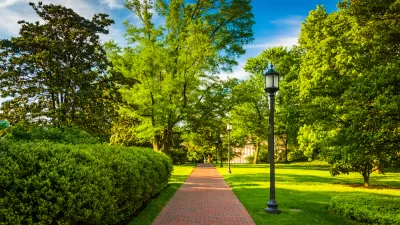Cities can take action to improve conditions during extreme heat events and prevent heat-related deaths, many of which occur in low-income communities.

As cities grow, so does their potential to generate heat, writes Matt Simon. “A city’s roads, buildings, and other infrastructure absorb the sun’s energy, raising temperatures far above those in surrounding rural areas.”
Combined with climate change, this “hyperlocal and erratic” effect, which can vary widely even from house to house, is making it “increasingly difficult to keep vulnerable (and rapidly growing) populations safe during extreme heat events.” As Simon points out, “For example, different kinds of building materials, like brick or wood, absorb and release heat differently. And tall buildings block winds that would otherwise cool a landscape.” Additionally, “This is a problem that doesn’t end when the sun goes down, because the built environment slowly releases its warmth throughout the night, keeping temperatures high.” And “Low-income neighborhoods have it worse, as apartments often lack AC to bring cool air in and proper insulation to keep warm air out. These neighborhoods also have less tree cover, which in richer neighborhoods helps attenuate the heat.”
Edith de Guzman, director and cofounder of the Los Angeles Urban Cooling Collaborative and her colleagues used simulations to assess how heat mitigation measures could improve outcomes in Los Angeles. “They found that making simple tweaks to the built environment, primarily adding trees and painting roofs light colors, would save one in four lives that would normally be lost to heat events.”
Simon asserts that “Perhaps it's time to think of heat as a treatable disease that affects a city, not just its people. Working with community leaders, cities like LA can develop more green spaces, for example,” and implement other strategies to help save lives during the heat waves that are becoming more and more common.
FULL STORY: Extreme Heat Is a Disease for Cities. Treat It That Way

Maui's Vacation Rental Debate Turns Ugly
Verbal attacks, misinformation campaigns and fistfights plague a high-stakes debate to convert thousands of vacation rentals into long-term housing.

Planetizen Federal Action Tracker
A weekly monitor of how Trump’s orders and actions are impacting planners and planning in America.

In Urban Planning, AI Prompting Could be the New Design Thinking
Creativity has long been key to great urban design. What if we see AI as our new creative partner?

Portland Raises Parking Fees to Pay for Street Maintenance
The city is struggling to bridge a massive budget gap at the Bureau of Transportation, which largely depleted its reserves during the Civd-19 pandemic.

Spokane Mayor Introduces Housing Reforms Package
Mayor Lisa Brown’s proposals include deferring or waiving some development fees to encourage more affordable housing development.

Houston Mayor Kills Another Bike Lane
The mayor rejected a proposed bike lane in the Montrose district in keeping with his pledge to maintain car lanes.
Urban Design for Planners 1: Software Tools
This six-course series explores essential urban design concepts using open source software and equips planners with the tools they need to participate fully in the urban design process.
Planning for Universal Design
Learn the tools for implementing Universal Design in planning regulations.
Gallatin County Department of Planning & Community Development
Heyer Gruel & Associates PA
JM Goldson LLC
City of Camden Redevelopment Agency
City of Astoria
Transportation Research & Education Center (TREC) at Portland State University
Jefferson Parish Government
Camden Redevelopment Agency
City of Claremont





























